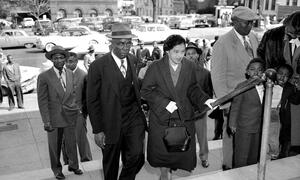Acclaimed Documentary ‘One Survivor Remembers’ Urges All to Never Forget


Martin Luther King Jr. is the most iconic figure of the Civil Rights Movement, but the narrative around his life and work is often oversimplified in classrooms and public discourse. We invite you to expand the narrative and teach a more complex and comprehensive view of Dr. King and a more honest history of the United States. Check out these Learning for Justice resources to better understand King’s strategies and goals, the context of the movement for equality and civil rights, and the work that remains to be done.
As the anniversary of the January 6 insurrection approaches, we are reminded that democracy requires regular practice from all of us, and media literacy is vital to that practice. We offer our first new resource of the year, our Media Literacy Resources page, which provides guidance for introducing these essential skills to children and young people.
Stories are a deeply meaningful way that we learn about the world, and they can build empathy and understanding of ourselves and others. In each issue of Learning for Justice magazine, we review some of our favorite recent books. Our selections reflect diverse perspectives, affirm identities, celebrate diversity and highlight justice. This week, as a special treat, we’re sharing some of our best-loved books for growing readers and teens from the last few magazine issues.
Young people deserve to learn honest history—history that is accurate, comprehensive and inclusive of perspectives beyond traditional, dominant narratives. Our newest resource guide, Advocating for Teaching Honest History: What Educators Can Do, offers concrete tools for educators seeking to ensure the right of future generations to an accurate accounting of our nation’s history.
The Montgomery Bus Boycott began on December 5, 1955, and lasted over a year. It’s difficult to overstate the influence of the boycott’s strategy, successes and leadership on how the Civil Rights Movement of the coming decades took shape. In our newest article, we examine the history of the Montgomery Bus Boycott through the lens of Learning for Justice’s newest framework, Teaching the Civil Rights Movement, and we recommend resources that help provide a fuller account of this pivotal event.

Understanding how school discipline policies can contribute to the school-to-prison pipeline is essential for educators and families. Harsh punishments, automatic out-of-class time and police involvement for discipline can push young people out of classrooms and into the criminal legal system. But educators, parents and caregivers can help to change this harmful system by advocating for and implementing practices that prioritize mental health and well-being.